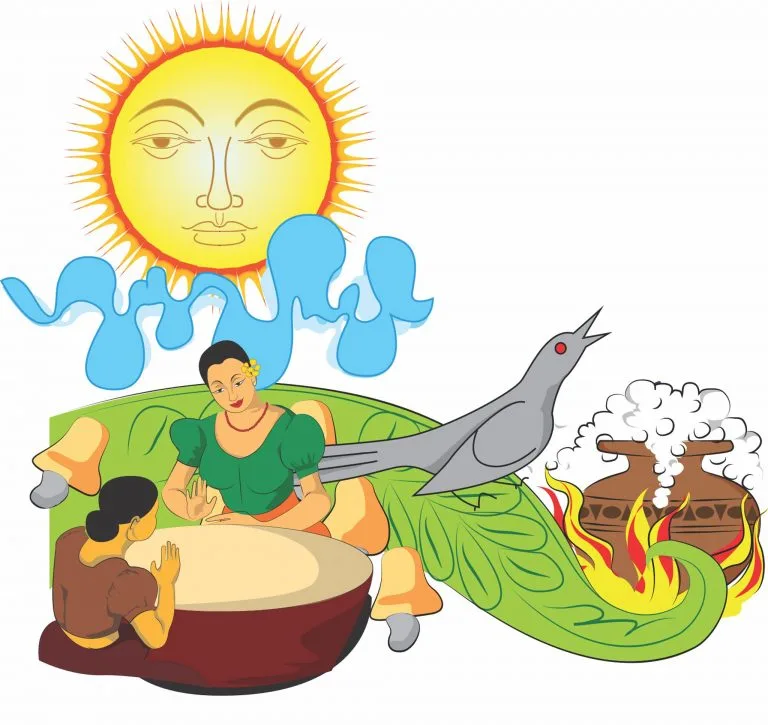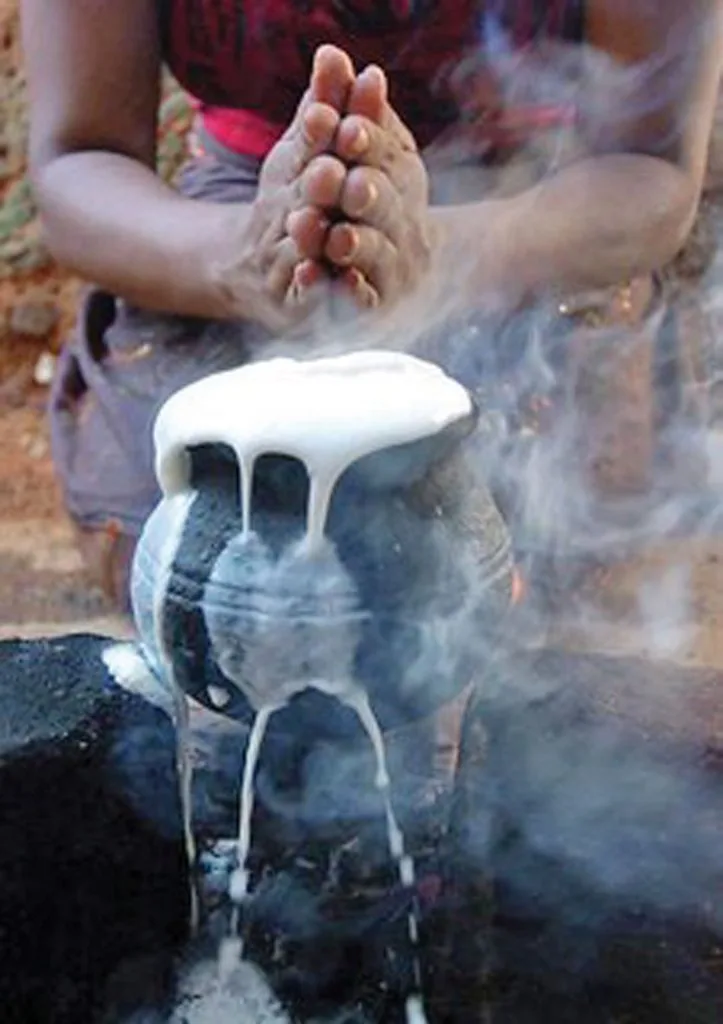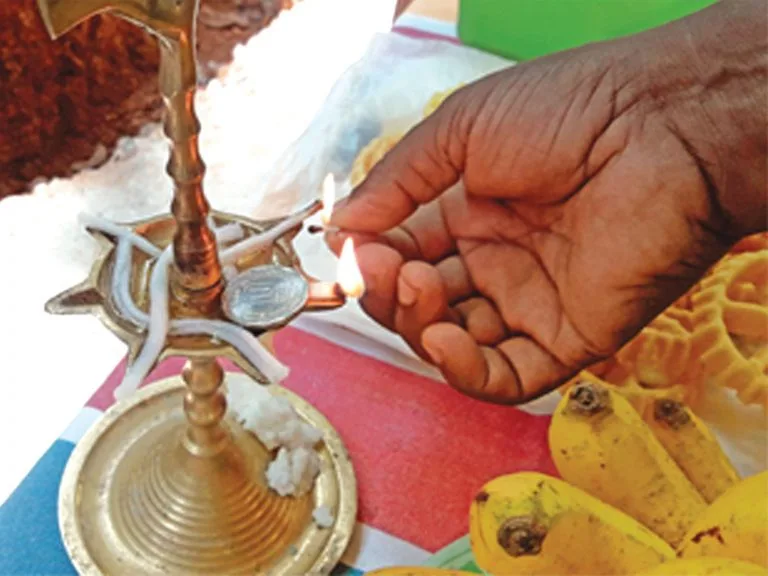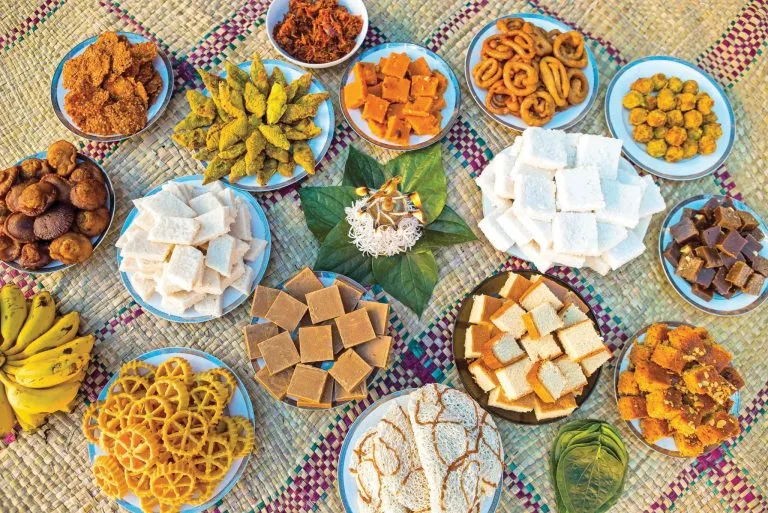
As a national festival, it is a unique celebration, as Sinhala Buddhists in Sri Lanka and other countries worldwide celebrate it as a festival and ritual, according to the ‘Neketh’ or auspicious times. The other important thing about this festival is the time it is celebrated.
According to the lunar calendar, it falls in the month of ‘Bak’ that’s April, based on the sun’s movement. The name of bak is derived from the Sanskrit word Bhagya, which means fortune.
Moreover, it signifies the reaping of the First Harvest in the year by the farming communities in villages. Accordingly, these customs and rituals portray the beliefs and thoughts of the village people.
Although they associate this festival with astrology concerning auspicious times, they never forget to fulfill Buddhist religious rituals. The other unique thing is that they inaugurate it with their family, relatives, and neighbors. On the other hand, the country’s ruling party gloriously celebrates it as a state festival.
When the Sinhala Avurudu season reaches, many signs usher in it, fresh leaves growing on trees and flowers blooming on trees, especially ‘Erabadu Mal’ can be seen, and plenty of fruits like mangoes, rambutans, avocados, and jack fruits. Besides that, a special guest’s message of ‘the Avurudu Enawa, the New Year is coming. So, he is non-other than the KOWULA or KOHA, a special bird like the crow, who appears only during this festival season. Unlike in the town area, village folks ripen plantains and make sweetmeats: Kewum, Kokis, Athirasa, Aggala, Asmi, and Aluva. Except for pre-preparation, they make special dressings for the festival by themselves, following the astrology and giving a new look to their old house by the village housewives cleaning and decorating their homes. The town folks, unlike the villagers, have everything prepared and packed in markets. But what they cannot buy like village people is the nature of the mental and physical feelings when the Avurudu dawns.
Before the New Year dawns, they have to view the moon for the old year and the new moon on the next day for the New Year. The ‘Sinhala Aluth Avurudu Neketh’ (the New Year auspicious times) are mentioned in the ‘Litha’ or the astrology guidance, the new year rituals, and festive schedules. They bathe at an auspicious time on the day of the festival by applying specified herbs. According to the old customs, the auspicious times to perform the different rituals would be announced by resonating the bells and beating the hewisi or drums in the village temples. But today, they are used to setting off firecrackers in towns and villages simultaneously. These rituals are being fulfilled during ‘Nonagathaya’ or the neutral period, which astrologers could not calculate. They prevent all types of work and dealings and engage in religious activities during this period. Therefore, it is also called ‘Punya Kalaya’. It is a time for families to gather and relax. According to their belief, the New Year would dawn the next day, usually on the 14th of April every year. People need to fulfill many rituals on New Year’s Day. So, they start the first half to consume the meals and keep off all types of work before fulfilling the religious traditions. According to the astrology guidance, the second half of New Year’s Day is devoted to ‘cooking and consuming meals, and engaging in work.’ They prepare the traditional meal, ‘Kiribath’ or milk rice. On this occasion also, there is an auspicious time to light the hearth, facing a specified direction. It is called in Sinhala – ‘Subha dishawa’ or auspicious direction. They boil milk in a new earthen pot, and it overflows on time, symbolizing prosperity. In the case of the ‘ceremony of engaging in work,’ they engage in limited work to auspicious time. After the dealings, it is time to consume milk, rice, and sweetmeats.
Another prominent feature is respecting the elders by offering a sheaf of betel. They also provide some presents to their kith and kin. In addition to that, they receive blessings from their parents as well. Visiting their friends and relations homes, they strengthen the sense of goodwill and friendship by exchanging presents and greetings during this Avurudu season. This is very useful for forgetting unhappiness and mistakes among relatives and friends and keeping up calm and well-being in society.
On the other hand, New Year means fulfilling customaries and rituals and time for entertainment.
Traditionally, they organize so many games at the beginning of the Avurudu like: olinda keliya, eluvan keliya, Raban gesima, onchili varan, keta gesima, gama wate diveema, kamba edima, and they engage in the marathon and bicycle races as well. Besides that, another exciting competition is selecting the Avurudu Kumaraya and Avurudu Kumari, or New Year Prince and Princess. Sometimes they offer some prizes and certificates to winners of the competitions.
According to the lunar calendar, The Sinhala New Year falls in the month of ‘Bak’ that’s April, based on the sun’s movement.
Usually, the New Year does not end within one day, but they get a chance to plant a tree the following day, at an auspicious time as a tree plantation campaign, which is very important for the whole world today.
Another significant occasion is the ritual of the anointing of oil. Individuals step on the herbal leaves placed on the floor on this occasion. Some herbal leaves are placed above the head because they provide a soothing effect for the body and mind. So, traditionally, this anointing is done by an elderly person in that area or by the temple’s chief priest. Therefore, sometimes it is organized by the temple in the village or town, as an ‘anointing of oil ceremony’ after fulfilling religious rituals, with the blessings for health and longevity. In other words, that means they apply herbal moisture and herbal oil on the head and take a bath. They believe these rituals help them for good health.
On the other hand, can they enjoy the Sinhala new year every day? No. Then they say, ‘Hema dama avurudu netha, (Every day is not New Year) so they have to start the work or business leaving the New Year behind. But they cannot just start the job, they have to seek a good time. Therefore, those who have to go for work or business looking for an auspicious time and direction to venture into it.
Is that all? No. They also have to dress in a new suit of a particular color and consume milk rice with some sweetmeats. Why do they like to have milk rice? According to Ayurveda, milk rice is soothing to the body; it cools the nervous system. Anyhow, to my mind, these astrologers are wonderful guys because they predicate to people about the auspicious times and directions for everything, whatever happened in their life.
What is the face on the other side of the same coin? Really, after the Avurudu is over, are they all being happy? Some are not, really, because their money is run out or debt to friends, or some have become a drunkard, while some have been hospitalized with injuries caused by crackers. On the other hand, there is a corona pandemic worldwide, interrupting the New Year. Therefore, you must participate in fewer activities in this pandemic period and limit it to only rituals to protect yourself from viruses and others. People can fulfill their new year customs with their own family, with limited individuals and giving the central part to the religious activities. Not only that, it is better to limit it to a very few days for all activities, then people can save their money and time. They can go through festivities without any trouble. Finally, I wish all readers and the people in the whole world good health, longevity, and peace in the New Year, without any sorrow and any wars in the world. Peace may prevail in the world!
Suba Aluth Avuruddak Wewa!






